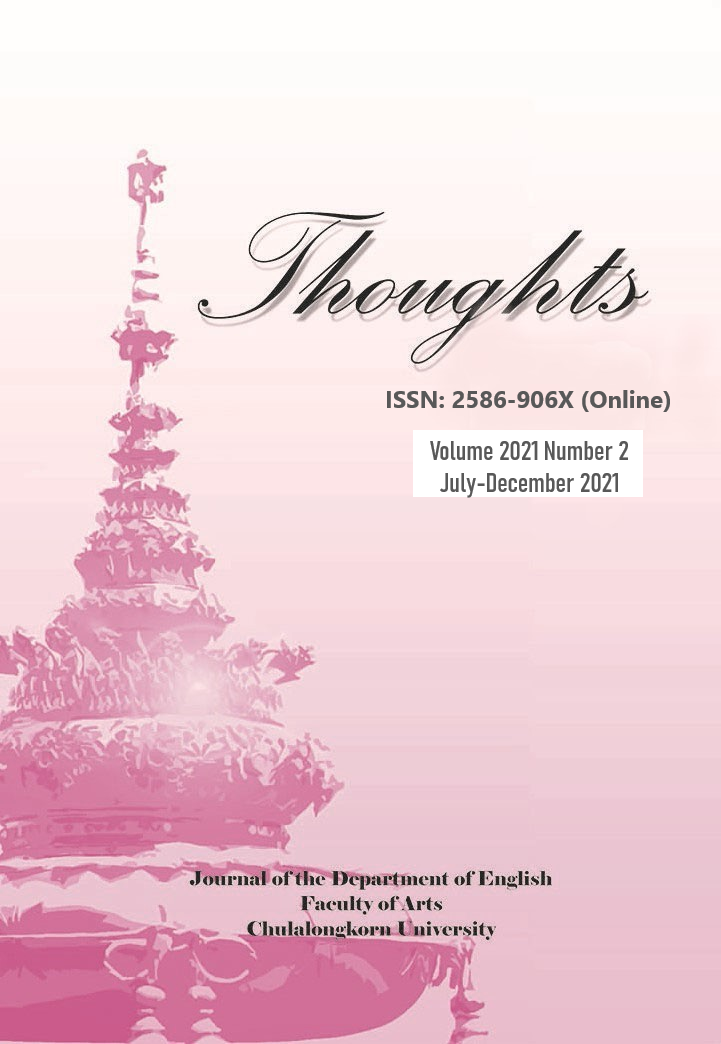Videogame Design as A Practical Approach to Virginia Woolf’s Orlando (1928)
DOI:
https://doi.org/10.58837/CHULA.THTS.2021.2.4Keywords:
Book-to-Game Adaptation, Virginia Woolf, Gender Identity, Game MechanicsAbstract
What might it be like to play Orlando as a video game? For someone who reads Woolf there is a cathartic pleasure to be found in reinterpreting and reimagining this compelling text in an interactive format. My attempt to transpose the narrative of Orlando into another mode of storytelling and experience operates within the logic that the craft of game mechanics is integral to, if not outweighed by, the meaningful message that the game wants to pass on. The project consists of three distinctive discussion questions; namely, the purpose of making Orlando a playable character, the possible options for implementation and how the selected approach might work. In this essay I provide an account of the development and potential of my thought experiment of adapting Orlando as a videogame. My exploration focuses entirely on the conceptual foundation for the game such as character design and development of a specific game mechanic.
References
Barr, P. (2020). Film adaptation as experimental game design. Arts, 9(4), 103. https://doi.org/10.3390/arts9040103
Bower, A. (2018, November 14). The odd and the indescribable - 11:45 A vivid life. TechRaptor https://techraptor.net/originals/odd-and-indiescribable-1145-vivid-life
Briggs, J. (2006). Reading Virginia Woolf. Edinburgh University Press.
Cutting, A. (2011). Interiority, affordances, and the possibility of adapting Henry James’s The Turn of the Screw as a video game. Adaptation, 5(2), 169–184.
Dhamanitayakul, C. (2018). The aesthetics of escapade: Virginia Woolf, Dora Carrington and Asta Nielsen contesting gender in life and art [Doctoral Dissertation, University of York]. White Rose E-Theses Online. https://etheses.whiterose.ac.uk/23987/
Dougcrozier. (2014, June 16). Know what you are getting into [Comment on the blog post “Super Hexagon”]. GOG. https://www.gog.com/game/super_hexagon
Elkington, T. (2009). Too many cooks: Media convergence and self-defeating adaptations. In B. Perron & M. J. P. Wolf (Eds.), The video game theory reader 2 (pp. 213-235). Routledge.
Elliot, K. (2014). Doing adaptation: The adaptation as critic teaching adaptations. In D. Cartmell & I. Whelehan (Eds.). Teaching Adaptations (pp. 71-86). Palgrave Macmillan.
Fassone, R. (2018). Notoriously bad: Early film-to-video game adaptations (1982-1994). In D. Cutchins, K. Krebs, & E. Voigts (Eds.), The Routledge Companion to Adaptation (pp. 106–116). Routledge.
Hutcheon, L. (2012). A theory of adaptation. Routledge.
Konzack, L. (2009). Philosophical game design. In B. Perron & M. J. P. Wolf (Eds.). The video game theory reader 2 (pp. 33-44). Routledge.
Layne, B. (2018). Biofiction and the paratext: Troubling claims to “Truth”. Virginia Woolf Miscellany 93, 15-18. https://dora.dmu.ac.uk/handle/2086/16628
Moore, M. R. (2010). Adaptation and new media. Adaptation, 3(2), 179–192. https://doi.org/10.1093/adaptation/apq010
Nicolson, N. (1992). A Portrait of a Marriage. Phoenix.
Novitz, J. (2020). ‘The time is out of joint’: Interactivity and player agency in videogame adaptations of Hamlet. Arts, 9(4), 122. https://doi.org/10.3390/arts9040122
Ouditt, S. (1999). Orlando: Coming across the divide. In D. Cartmell, & I. Whelehan (Eds.), Adaptations: From Text to Screen, Screen to Text (pp. 146–156). Routledge.
Potter, S. (n.d.). Notes on the adaptation of the book Orlando. Retrieved October 1, 2021, from https://www.uah.edu/woolf/Orlando_Potter.htm
Rickels, L. A. (2008). Ulrike Ottinger: The autobiography of art cinema. University of Minnesota Press. http://www.jstor.org/stable/10.5749/j.ctttt1hf
Rouse, R., III. (2005). Game design: Theory and practice (2nd ed.). Wordware Publishing.
Ruberg, B. (2020). The queer game avant-garde: How LGBTQ game makers are reimagining the medium of video games. Durham: Duke University Press.
Smith, A. (2012, June 28). Wot I think: Thomas was alone. Rock Paper Shotgun. https://www.rockpapershotgun.com/wot-i-think-thomas-was-alone
Stobbart, D. (2018). Adaptation and new media: Establishing the video game as an adaptive medium. In D. Cutchins, K. Krebs, & E. Voigts (Eds.), The Routledge Companion to Adaptation (pp. 382-389). Routledge.
Townsend, E. (2006, November 8). The 10 worst game of all time: A bottom-ten list that leads to surprisingly philosophical questions. PC Word. https://www.pcworld.idg.com.au/article/print/165975/10_worst_games_all_time/
Woolf, V. (1926, August 4). The movies and reality. The New Republic. https://newrepublic.com/article/120389/movies-reality
_____. (1953). A writer’s diary: Being extracts from the diary of Virginia Woolf (L. Woolf, Ed.). Hogarth Press.
_____. (1978). The letters of Virginia Woolf Vol. III, 1923-1928 (N. Nicholson, Ed.). Hogarth Press.
_____. (2003). A writer’s diary: Being extracts from the diary of Virginia Woolf. Harcourt.
_____. (2014) Orlando: A biography. Collins Classics. (Original work published 1928)
Downloads
Published
Versions
- 2022-01-22 (3)
- 2022-01-22 (2)
- 2021-12-28 (1)
Issue
Section
License
Copyright (c) 2021 Thoughts

This work is licensed under a Creative Commons Attribution-NonCommercial-NoDerivatives 4.0 International License.
Copyright by the Faculty of Arts, Chulalongkorn University.
Photocopying is allowed for internal, non-commercial use only. Photocopying for other uses or for purposes other than indicated must be permitted in writing from the Faculty of Arts, Chulalongkorn University.
All views or conclusion are those of the authors of the articles and not necessarily those of the publisher or the editorial staff.


